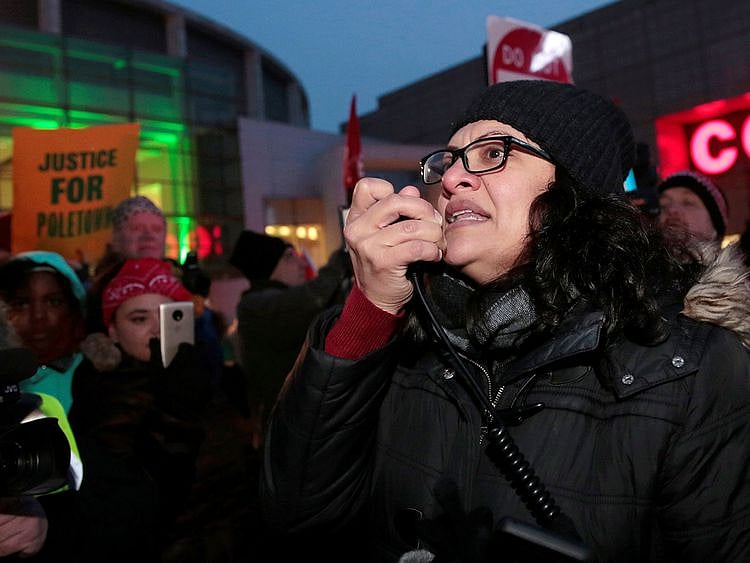Washington - Representatives Rashida Tlaib of Michigan and Ilhan Omar of Minnesota were hailed as symbols of diversity when they were sworn in last month as the first two Muslim women to serve in Congress, Tlaib in her mother’s hand-embroidered Palestinian thobe, Omar in a tradition-shattering hijab.
Four weeks later, their uncompromising views on Israel have made them perhaps the most embattled new members of the Democratic House majority. Almost daily, Republicans brashly accuse Tlaib and Omar of anti-Semitism and bigotry, hoping to make them the Democrats’ version of Representative Steve King as they try to tar the entire Democratic Party with their criticism of Israel.
And while Democratic leaders publicly defend them, some Democratic colleagues are clearly uneasy. Representative Ted Deutch, a founder of a bipartisan task force to combat anti-Semitism, said some of the lawmakers’ comments “fall into long-standing anti-Semitic tropes.” When Omar was named to the House Foreign Affairs Committee, its chairman, Representative Eliot Engel of New York, told her privately that he would not allow some of her “particularly hurtful” remarks to be “swept under the rug,” Engel said.
The tussle over Tlaib and Omar has exposed a growing generational divide within the Democratic Party, pitting an old guard of stalwart supporters of Israel against an ascendant wing of young liberals - including many young Jews - willing to accuse the Israeli government of human rights abuses and demanding movement towards a Palestinian state.
For the Democratic Party, where most Jews have long made their political home, the risks are clear - and visible across the Atlantic. In Europe, left-wing parties are courting Muslim immigrant voters with increasingly anti-Israel positions, while the populist right is wooing Jews and cozying up to Israel’s right-wing government. In Britain, the leader of the Labour Party is besieged by accusations of anti-Semitism, bringing British Jews to the streets of London in protest.
President Donald Trump and Republicans are trying to find the same rifts among Democrats. Next week, the Senate is expected to easily pass legislation aimed at curbing the boycott-Israel movement - and stifling the new Democratic voices like Tlaib and Omar that back it. The bill would allow state and local governments to break ties with companies that participate in the Boycott, Divestment, Sanctions, or BDS, movement, which is intended, among other things, to pressure Israel into ending the occupation of the West Bank, and backed by some who advocate a single state with equal rights for all, instead of a Palestinian state alongside Israel.
Backers of BDS, including Tlaib and Omar, argue that economic boycotts are protected by the constitutional right to free speech; opponents insist the movement’s true goal is to destroy Israel as a Jewish state. The Senate bill, which has considerable Democratic support, is destined to fail in the House, where Rep. Hakeem Jeffries, the Democratic caucus chairman, has labeled it a “political stunt.”
But the debate is more than political. It is also playing out at the uncomfortable intersection of race, gender and religion in a Capitol whose complexion has changed dramatically with the arrival of an extraordinarily diverse freshman class. Allies of Tlaib and Omar accuse Republicans of bullying and bigotry, and they say Republicans are looking for a Democratic twin of King, the Iowa Republican who was recently rebuked by the House for his seeming embrace of white supremacy.
“I see this as an Islamaphobic attack against two outspoken women of colour who are shaking things up by boldly standing for crucial issues,” said Yousuf Munayyer, executive director of the US Campaign for Palestinian Rights. Critics of Tlaib and Omar, he said, are failing to recognize that “Palestine is increasingly becoming part of the progressive politics of justice for all.”
Both women are under fire for comments they have made on Twitter, and in Tlaib’s case, for her association with Palestinian rights activists who have used social media either to express or share extreme views, such as equating Zionism with Nazism. Both declined to be interviewed, instead sending written statements in which they expressed their commitment to fighting hatred of any kind, while also standing up for the oppressed.
Sign up for the Daily Briefing
Get the latest news and updates straight to your inbox
Network Links
GN StoreDownload our app
© Al Nisr Publishing LLC 2026. All rights reserved.
